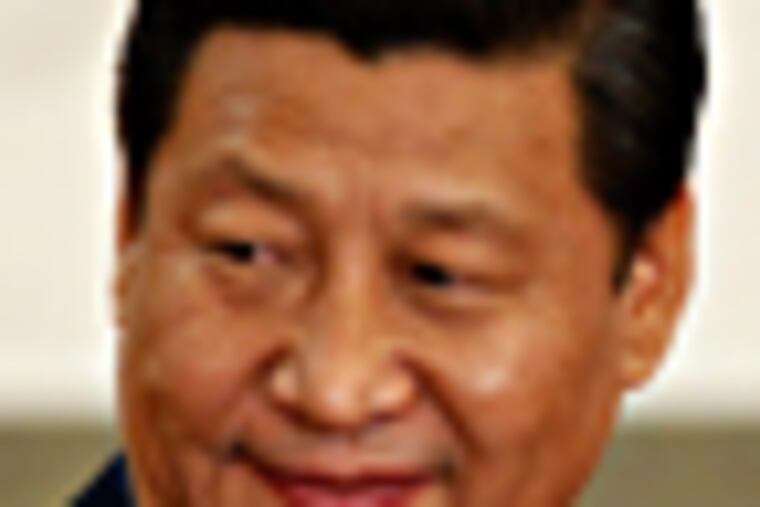China's Xi a regular guy
The new leader has an ease and affability his predecessor lacked.

BEIJING - In his travels abroad, Xi Jinping has often been something unusual for a Chinese communist leader: an ordinary guy.
In Ireland, he stopped at a stadium to kick a soccer ball around. On a key getting-to-know-you visit to the United States, he took several hours to visit with Midwestern families who had hosted him more than a quarter-century before. While visiting with schoolchildren in Los Angeles, Xi talked of his love of sports and films and about how finding personal family time was "mission impossible."
And even Thursday in the Great Hall of the People, when he was introduced as the Chinese Communist Party's new secretary-general, the most powerful man in the world's most populous nation showed some humility. He apologized to the media for running 45 minutes late.
Xi has an ease and affability that have been lacking from China's leader of the last 10 years, Hu Jintao, though it's unclear whether that will make him a stronger force for change. He is first among equals in Beijing's new seven-member collective leadership.
"It's the people who have created history, and it is the people who are true heroes. The people are the source of our strength," Xi told reporters packed into a meeting room at the Great Hall of the People in Beijing.
Xi is married to popular folk singer Peng Liyuan. His daughter, Xi Mingze, studies at Harvard University. Tall and heavyset, Xi's demeanor contrasts with China's typically stiff and aloof leaders.
"He's someone who you can connect with," said Jon Huntsman, former U.S. ambassador to Beijing.
Forceful foreign policy
A Xi administration is expected to pursue a more forceful foreign policy based on Beijing's belief that its chief rival, Washington, is in decline and that China's rise to global preeminence is within reach.
"Xi was chosen in part because he has the large, assertive, confident personality to lead in that kind of strategy," said Andrew Nathan, an expert on Chinese politics at New York's Columbia University.
It is in the nature of China's politics that relatively little is known about Xi's policy leanings. He is not associated with any bold reforms. Aspiring officials get promoted by encouraging economic growth, tamping down social unrest, and toeing the line set by Beijing, not through charismatic displays of initiative.
Xi has excelled at quietly rising through the ranks by making the most of two facets: He has an elite, educated background with links to communist China's founding fathers that are a crucial advantage in the country's politics, and at the same time he has successfully cultivated a common-man mystique that helps him appeal to a broad constituency.
He was sent to a rural hinterland at age 15 to learn peasant virtues after his father fell out of favor with Mao Tse-tung.
Hardship
His seven years in the remote northern community of Liangjiahe meant toiling alongside villagers by day and sleeping on bricks by night, in stark contrast to his pampered early years in Beijing. He spent much of his youth living in a dug-out cave.
"Knives are sharpened on the stone. People are refined through hardship," Xi said in a rare 2001 interview with a Chinese magazine. "Whenever I later encountered trouble, I'd just think of how hard it had been to get things done back then and nothing would then seem difficult."
Rejected for Communist Party membership nine times due to his father's political problems, Xi finally gained entry in 1974 and then attended the elite Tsinghua University.
Xi went on to earn a chemistry degree, by which time Mao had died and his father had been restored to office. Xi next secured a plum position as secretary to Defense Minister Geng Biao, one of his father's old comrades.
But Xi took the unusual step three years later of jumping to a lowly post in rural Hebei province, because he wanted to "struggle, work hard, and really take on something big," Xi told Elite Youth magazine's now-deceased editor Yang Xiaohuai.
After a brief spell in charge of Shanghai, Xi was brought to Beijing and handed the high-profile task of overseeing the 2008 Beijing Olympics.
Xi's resume in provincial posts suggest he is open to private industry and some administrative reforms as long as they don't jeopardize the Communist Party's monopoly on power.